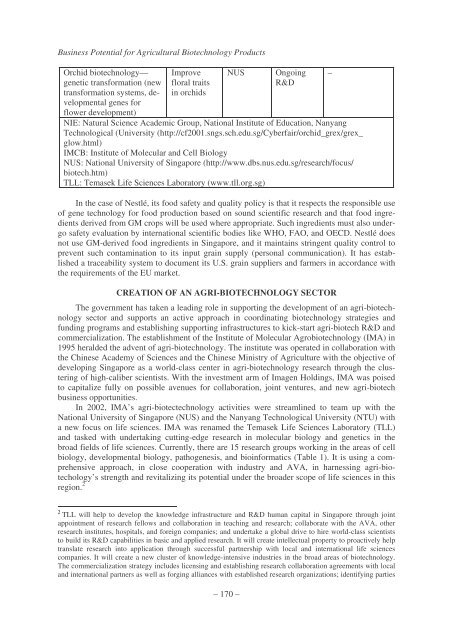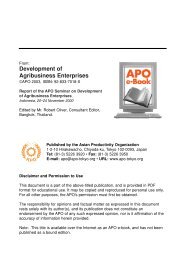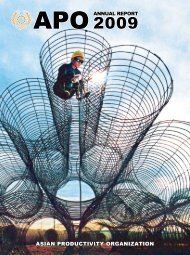Business Potential for Agricultural Biotechnology - Asian Productivity ...
Business Potential for Agricultural Biotechnology - Asian Productivity ...
Business Potential for Agricultural Biotechnology - Asian Productivity ...
Create successful ePaper yourself
Turn your PDF publications into a flip-book with our unique Google optimized e-Paper software.
<strong>Business</strong> <strong>Potential</strong> <strong>for</strong> <strong>Agricultural</strong> <strong>Biotechnology</strong> Products<br />
Orchid biotechnology—<br />
genetic trans<strong>for</strong>mation (new<br />
trans<strong>for</strong>mation systems, developmental<br />
genes <strong>for</strong><br />
flower development)<br />
Improve<br />
floral traits<br />
in orchids<br />
– 170 –<br />
NUS Ongoing<br />
R&D<br />
NIE: Natural Science Academic Group, National Institute of Education, Nanyang<br />
Technological (University (http://cf2001.sngs.sch.edu.sg/Cyberfair/orchid_grex/grex_<br />
glow.html)<br />
IMCB: Institute of Molecular and Cell Biology<br />
NUS: National University of Singapore (http://www.dbs.nus.edu.sg/research/focus/<br />
biotech.htm)<br />
TLL: Temasek Life Sciences Laboratory (www.tll.org.sg)<br />
In the case of Nestlé, its food safety and quality policy is that it respects the responsible use<br />
of gene technology <strong>for</strong> food production based on sound scientific research and that food ingredients<br />
derived from GM crops will be used where appropriate. Such ingredients must also undergo<br />
safety evaluation by international scientific bodies like WHO, FAO, and OECD. Nestlé does<br />
not use GM-derived food ingredients in Singapore, and it maintains stringent quality control to<br />
prevent such contamination to its input grain supply (personal communication). It has established<br />
a traceability system to document its U.S. grain suppliers and farmers in accordance with<br />
the requirements of the EU market.<br />
CREATION OF AN AGRI-BIOTECHNOLOGY SECTOR<br />
The government has taken a leading role in supporting the development of an agri-biotechnology<br />
sector and supports an active approach in coordinating biotechnology strategies and<br />
funding programs and establishing supporting infrastructures to kick-start agri-biotech R&D and<br />
commercialization. The establishment of the Institute of Molecular Agrobiotechnology (IMA) in<br />
1995 heralded the advent of agri-biotechnology. The institute was operated in collaboration with<br />
the Chinese Academy of Sciences and the Chinese Ministry of Agriculture with the objective of<br />
developing Singapore as a world-class center in agri-biotechnology research through the clustering<br />
of high-caliber scientists. With the investment arm of Imagen Holdings, IMA was poised<br />
to capitalize fully on possible avenues <strong>for</strong> collaboration, joint ventures, and new agri-biotech<br />
business opportunities.<br />
In 2002, IMA’s agri-biotectechnology activities were streamlined to team up with the<br />
National University of Singapore (NUS) and the Nanyang Technological University (NTU) with<br />
a new focus on life sciences. IMA was renamed the Temasek Life Sciences Laboratory (TLL)<br />
and tasked with undertaking cutting-edge research in molecular biology and genetics in the<br />
broad fields of life sciences. Currently, there are 15 research groups working in the areas of cell<br />
biology, developmental biology, pathogenesis, and bioin<strong>for</strong>matics (Table 1). It is using a comprehensive<br />
approach, in close cooperation with industry and AVA, in harnessing agri-biotechology’s<br />
strength and revitalizing its potential under the broader scope of life sciences in this<br />
region. 2<br />
2 TLL will help to develop the knowledge infrastructure and R&D human capital in Singapore through joint<br />
appointment of research fellows and collaboration in teaching and research; collaborate with the AVA, other<br />
research institutes, hospitals, and <strong>for</strong>eign companies; and undertake a global drive to hire world-class scientists<br />
to build its R&D capabilities in basic and applied research. It will create intellectual property to proactively help<br />
translate research into application through successful partnership with local and international life sciences<br />
companies. It will create a new cluster of knowledge-intensive industries in the broad areas of biotechnology.<br />
The commercialization strategy includes licensing and establishing research collaboration agreements with local<br />
and international partners as well as <strong>for</strong>ging alliances with established research organizations; identifying parties<br />
–
















